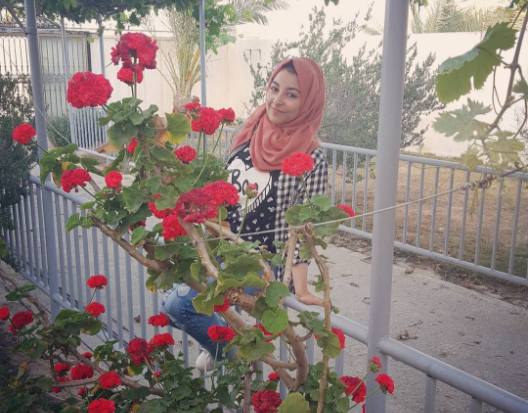
By Hannah Brandt
In July 2014, just a month before Americans were confronted with the images of 17-year-old Michael Brown lying dead from police gunshots on the street in Ferguson, Mo., television screens were filled with the brutal carnage in Gaza. Like footage of the war in Syria, images of the war in Gaza were absolutely devastating. The Gaza Strip is home to almost two million Palestinians and Gaza City’s population is 500,000, the size of Fresno. Gaza City neighborhoods like Shuja’iyya and Beit Hanoun were nearly completely destroyed by Israeli shelling.
Following things unfold on television and online, people around the world read harrowing tweets from Gazans trapped by the violence. The way the seaside community is isolated by Israeli military checkpoints and a wall on one side, a blocked crossing into Egypt on another, and the ocean, there was no way to escape. Amid this, I reached out to one young woman living in Gaza named Dina Samir, an 18-year-old medical student.
We managed to set up a Skype interview at the end of July 2014, and I wrote up her account of the conditions on the ground during the war. It was published in the Community Alliance in December 2014, a few months after the conflict had technically ended (https://fresnoalliance.com/i-just-want-a-normal-life-one-gazan-girls-wish-for-herself-and-her-home/). Through social media, I have continued to keep up with Dina, who is now 21 years old.
Like most girls her age, she shares lots of selfies with Snapchat filter flower wreaths adorning her head. Dina loves to share photos of her life in Gaza, images of everyday experiences with which most Americans would identify: studying at school, shopping at the mall, drinking coffee with friends, going to the beach. The difference in Dina’s case is that the school she attends was bombed during the war and has still not been fully rebuilt. And the beach she frequents is the same one where three little Palestinian boys were killed by Israeli forces while playing soccer.
Through text messages exchanged at the end of July, I asked her how things have changed since the war ended in late summer of 2014. She said they have not changed much. On July 29, 2014, Gaza’s only power plant was struck by Israeli artillery. To this day, Gazans only get two to four hours of electricity a day. They rely heavily on battery-powered backups for phone charging, and she often does her studying by candlelight. Refrigeration is problematic with only intermittent electricity, which means food storage of perishables for more than a day is impossible. This, in a highly densely populated, urban area.
Access to clean drinking water is also difficult. Gaza’s sewage treatment plant is rendered useless without regular electricity. This means raw sewage gets into the water supply, contaminating crops like those Dina told me got people sick from tainted watermelon. It is also flowing into the ocean, making swimmers sick and killing fish. Fishing is one of the most important industries for Gaza but with the coastline contaminated and Israeli restrictions on Palestinian boats going out more than 3 miles from the shore, it has practically shut down. Fishermen who risk taking their boats further out to sea have been shot by Israeli forces.
According to the United Nations, a quarter of a million people in Gaza were displaced by July 31, 2014. Seventy percent of Beit Hounan neighborhood and 20%–25% of Gaza City housing was destroyed. Hundreds of mosques and the houses of families of supposed terrorists were blown apart, regardless if children and elderly friends and relatives were still inside. Dina says that many houses in her area that were damaged in the war continue to be rubble. Thousands of Gazans are still homeless.
Also, hospitals in Gaza struggle to remain operational. Surgeries are essentially nonexistent now. Without reliable electricity, dialysis and other life support machines do not work. During the war, Israel claimed that the military wing of the Hamas government in Gaza was hiding weapons in schools and hospitals. So, the Israeli military bombed these buildings even though the United Nations had evacuated people there as safe zones. If these tactics sound familiar, it is because they are being used by the Assad regime in Syria and by Saudi Arabia in Yemen, as well. They are war crimes under the Geneva Convention.
Another reason the rebuilding of Gaza has been out of reach is the Israeli blockade. This policy toward Gaza, which has been in place since 2007, remains, meaning hygiene products, medical supplies, building materials and other necessities only sporadically get into Gaza. And people still cannot leave. Dina has family in the West Bank she cannot see. One of the holiest mosques in Islam, Al-Aqsa in Jerusalem, has again recently been barred to all Palestinians after a violent attack by a few Palestinians individuals. Collective punishment is also prohibited under the Geneva Convention.
Viewing Dina’s lively, colorful photos of her life on Instagram is a complete disconnect from this brutal reality. She manages to show the beauty in her life, sharing the very real warmth and love in an escape from the also real ugliness. In Gaza, misery and beauty live side by side.
*****
Hannah Brandt is the editor of the Community Alliance newspaper. Follow her on Twitter and Instagram at @HannahBP2. Follow the paper on Facebook at Community Alliance Newspaper and on Twitter and Instagram @fresnoalliance.
